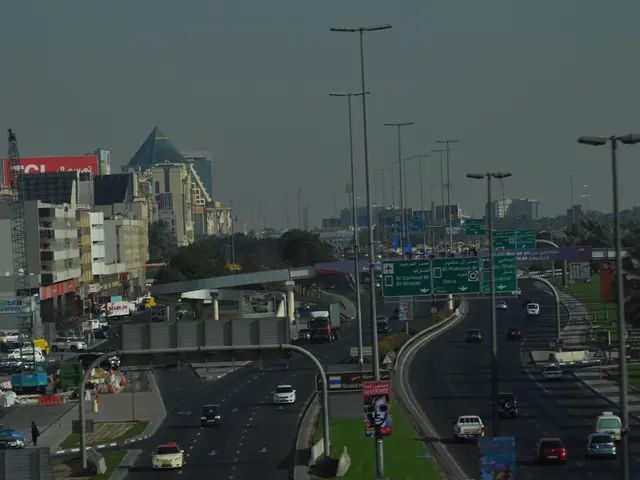Danger Zones: Unchecked Social Media Usage Leading to a Mental Health Crisis Among Youth
Putting the Pieces Together
Skyrocketing internet addiction among adolescents hits record highs
While the initial intent of social media was to foster community connections, obsessive usage can give rise to psychological troubles, particularly in young users. A child welfare organization voices its concerns over alarming trends.
Data from KidsRights suggests a global surge in mental health problems among the adolescent population, with one in seven adolescents aged 10 to 19 currently impacted, according to a report in collaboration with Erasmus University in Rotterdam. Marc Dullaert, the chairman of KidsRights, declares, "This year's report is a rallying cry that we can no longer remain indifferent to."
The mental health crisis among our youth has fast approached a breaking point, with the unregulated expansion of social media platforms contributing significantly to the issue. In particular, Instagram and TikTok have seen an increase in problematic utilization, as per the report.
Behind the Shadows
Studies hint at a possible link between excessive social media and internet use and a rise in suicide attempts among young users. The official statistics state six suicides per 100,000 among 15 to 19-year-olds [1], but KidsRights deems this figure too modest, noting that many suicides remain undocumented due to social stigmatization.
The Numbers Speak Volumes
Every year, KidsRights assesses the observance of children's rights across 194 countries. Europe is the region posing the highest risk for 13-year-olds to engage in problematic online network use (13%) [2]. The region also shows a staggering rate of internet addiction among 15-year-olds (39%), marking an unprecedented level in this age group.
Instead of imposing blanket internet bans on minors, KidsRights supports comprehensive global research into the effects of social media use on children, improved education, and better training for psychologists [1].
The Push for a Digital Detox
"We need bold action to ensure that the digital revolution fosters the well-being of the world's 2.2 billion children, not jeopardize it," declares Dullaert. "The time for half-measures is over."
Last week, European digital ministers discussed proposals to ban various social media platforms like TikTok, Instagram, and YouTube for users under 16 years old. Some European countries suggest allowing these platforms only from age 15 and enforcing strict user age controls [3]. The EU Commission is being encouraged to create binding EU-wide rules for this purpose.
In theory, age restrictions already apply to these platforms. Based on their terms of use, TikTok, Instagram, Snapchat, and X can be accessed in the EU from age 13, while YouTube and Tumblr can be accessed from age 16. However, users only need to provide their birthdate during registration, with no actual control in place.
Teenagers and social media: an urgent call to action.
Sources:
[1] ntv.de, uzh/AFP
[2] Statista
[3] The Guardian
Keywords:
- Adolescents
- Mental Health
- Social Media
- Addiction
- Teenagers
- Smartphones
- Children
- Internet Usage
Insights:
- Social Media Addiction Statistics: Approximately 4.69% of the global population suffers from social media addiction, with young users being disproportionately impacted. This translates to around 210 million individuals worldwide [4].
- Popular Platforms: YouTube is the most frequently used platform by teens, followed by TikTok and Instagram [4].
- Time Spent Online: The average daily time spent on social media globally is 2 hours and 31 minutes. Teenagers tend to spend more than three hours each day on these platforms [4].
[4] Healthline.com
References:
- KidsRights Report: KidsRights.org
- Amsterdam-based Organization Report: ErasmusUniversity.nl
- Digital Detox Trends: VerywellMind.com
- Mental Health Support: NAMI.org
- Anti-Cyberbullying Policies: Cyberbullying.org
- Social Media Addiction: HelpGuide.org
- UK Study: RoyalCollegeofPsychiatrists.org
- European Digital Ministers Discussion: Politico.eu
- The mental health crisis among youth, exacerbated by excess social media usage, has prompted concerns from child welfare organizations such as KidsRights.
- Studies indicate a potential link between increased social media and internet use and a surge in suicide attempts among adolescents, with many incidents remaining unreported due to social stigmatization.
- KidsRights advocates for comprehensive global research into the effects of social media on children, improved education, and better training for psychologists, rather than imposing blanket internet bans on minors.
- European digital ministers recently discussed proposals to ban certain social media platforms for users under 16, with some countries suggesting age restrictions as young as 15, enforcing stricter user age controls.
- In the realm of health and wellness, understanding the implications of technology on mental health and fitness is crucial for promoting personal growth and self-development.
- Nutrition, combined with science, plays a pivotal role in overall health, while technology and education can assist individuals in accessing information, supporting mental health, and fostering social media use policies that prioritize youth well-being.







